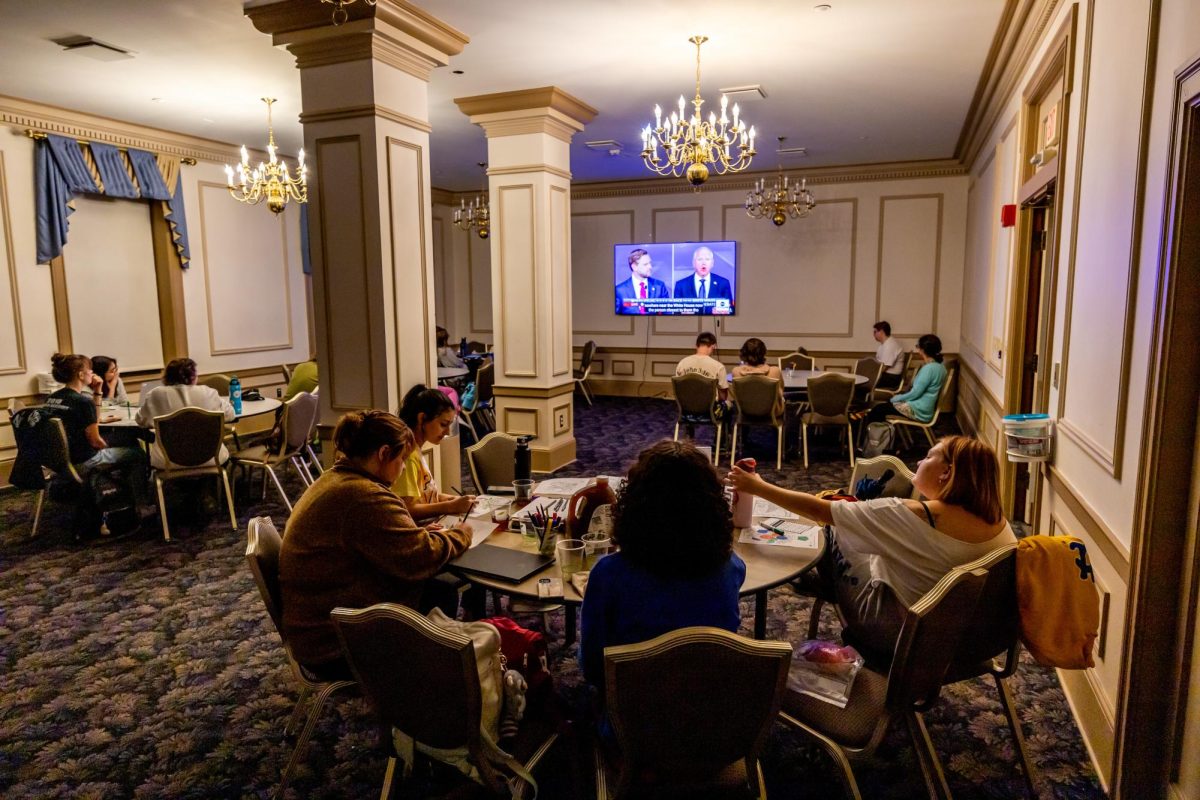Because of the key role young voters hold in the 2024 presidential election, political groups on campus often hold watch parties, invite speakers to come on campus, or table to energize student political engagement.
“It’s super important to get people engaged,” Sam Podnar, junior politics and philosophy student and co-president of Democrats at Pitt, said. “That’s what we’ve been trying to do. We’ve been having at least a few events a week … to hype people up, get people excited, give them a place to talk about politics.”
Some Republican student voters say it’s harder to freely express their political views than it is for their Democrat peers on college campuses. Josh Misky, a senior neuroscience major and president of College Republicans at Pitt, highlighted student reactions to on-campus Republican events.
“When we’re tabling and stuff on campus, we do get a lot of nasty looks from students,” Minsky said. “People obviously aren’t very happy that we’re doing it because they have preconceived notions about what we stand for, so they don’t like us … In terms of campus culture, there’s certainly a lot of hostility.”
Because of this tension, some members of College Republicans at Pitt don’t feel comfortable publicly expressing their political views, according to Minsky.
“The progressive left, [or] the Democratic party in general, has completely dominated the culture and mindset of people our age,” Minsky said. “There’s plenty of people in our club that don’t want other people to know they’re in it … they don’t even want to be in the pictures. That’s obviously because they’re afraid of backlash, they’re afraid of being judged.”
Joseph Chuzie, a first-year English major, said that this judgment stems from the fact that “majority of universities, anywhere you go, probably lean politically left.” Regardless of this majority, he doesn’t think there should be any censorship in campus events.
“It’s a free country, so you can express your ideas how you see fit,” Chuzie said. “If you’re 18, you’re of age to vote. So, sure, get involved. I mean, these are policies that ultimately affect you.”
Podnar said free speech policies on campus can be “pretty difficult” to navigate. In regard to the Charlie Kirk “You’ve Been Brainwashed Tour” event on September 18, Podnar was “not comfortable with how the Turning Point event was run.”
“We felt it put a lot of students in danger,” Podnar said. “The Charlie Kirk event was very unique because it fostered a very hateful and hostile rhetoric, and that’s the opposite of what we try to do here … their main goal is to be inflammatory.”
Minsky, the former vice president of Turning Point at Pitt, helped host the Charlie Kirk event. After a video of a girl from the event went viral on Turning Point USA’s social media because she seemingly exposed herself to Kirk, Minsky and other officers were “disgusted,” and Pitt’s chapter of Turning Point disbanded.
“I think the idea of talking to voters who disagree with you, which is the point of the event, that’s productive and important,” Minsky said. “But what Turning Point did was disgusting. Before they released the video, the event was fine.”
Minsky disagrees with the notion of preventing right-wing speakers from coming to campuses.
“I see no problem with having these events,” Minsky said. “I think if people have problems with right-wing speakers coming to campus and expressing their views then they’re actually the problem, because they don’t tolerate free speech.”
But, as a conservative, Minsky said that on a “liberal campus like Pitt, everyone disagrees with us.”
“We’re very used to that,” Minsky said. “We understand when we talk to people about politics, 90% of the time they disagree with us. And that’s fine. And we have those conversations. When we have been forced to defend what we think basically our entire lives, or at least at our career at Pitt, we know how to handle it when someone says ‘no.’”
The Charlie Kirk event was an opportunity for right-leaning students to express their political beliefs in a way that they previously weren’t, according to Minsky.
“There’s a lot of Republicans on campus, and for the first time people were proudly wearing ‘Make America Great’ hats – people were proudly supporting Trump on campus,” Minsky said. “For once, they’re allowed to express themselves … I think it was good for free speech to show that we can have a voice too, and you’re not going to intimidate us into shutting up.”
Minsky noted that student membership in College Republicans at Pitt this semester has “grown a lot.” Similarly, Podnar has seen an increase in students attending Democrats at Pitt events. Both leaders want to create spaces that allow “open discourse.”
“We really just try to foster a sense of openness and hope,” Podnar said. “We also just try to make sure that everyone knows that they’re welcome. We try to foster an open discourse where everyone’s able to talk about whatever they want, where they’re able to talk about the candidates and engage with each other.”
Minsky hopes that there will soon be room for all political beliefs on college campuses.
“Both sides have to be willing to talk to each other,” Minsky said. “The other side needs to stop pretending that everyone who disagrees with them is their enemy, which a lot of them do. And then on our side, as College Republicans, we need to be more proactive about promoting members and be more proud of what we think. I think that a little bit of effort on each of these things will provide a much better campus climate.”


